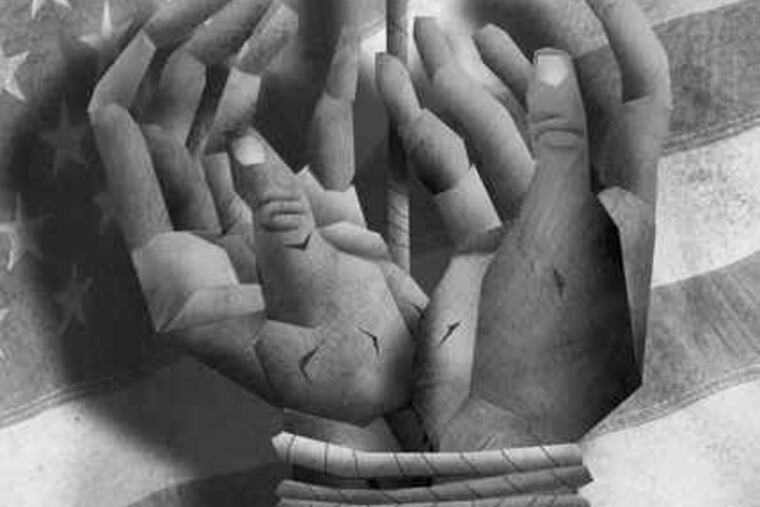SURVIVING TORTURE
As the debate about torture continues, one of the nation's most valuable resources, the Vietnam POWs, goes largely untapped.

Leo Thorsness is a retired Air Force colonel, a Medal of Honor recipient, and author of "Surviving Hell: A POW's Journey"
As the debate about torture continues, one of the nation's most valuable resources, the Vietnam POWs, goes largely untapped.
Of the 350 "old-timer" POWs - those held for five years or longer - the majority were tortured by the North Vietnamese. The Department of Defense did not study torture after the POWs were released in 1973. We're a "torture database," but the Pentagon has yet to do a study about our experience.
I and many other Vietnam POWs were tortured severely - some were tortured to death. Several POWs wrote books after their release describing their experiences. John "Mike" McGrath's book Prisoner of War: Six Years in Hanoi had extensive drawings vividly depicting the types of torture the North Vietnamese used.
When I wrote about my wartime experiences in Surviving Hell last year, initially I did not include torture because I knew others had given detailed accounts. However, my editors encouraged me to add it, reasoning that if younger Americans read only current books, they may perceive the treatment of detainees at Abu Ghraib and Guantanamo as real torture. So I added my experiences. I want readers to know that there is abuse and humiliation, and there is torture.
If someone surveyed the hundreds of surviving Vietnam POWs, we would likely not agree on one definition of torture. In fact, we don't agree on whether waterboarding is torture. For example, Sen. John McCain (R., Ariz.), George "Bud" Day, and I were recently together. Bud, one of the toughest and most tortured POWs, was the senior officer in the camps, and he received the Medal of Honor for his heroism in Vietnam.
McCain thinks waterboarding is torture; Bud and I believe it is harsh treatment, but not torture. Other POWs would have varying opinions. I don't claim to be right; we just disagree.
As someone who has been severely tortured over an extended time, my firsthand view is this:
Torture, when used by an expert, can produce useful, truthful information. I base that on my experience. I believe that during torture, there is a narrow window of truth as pain (often multiple kinds) is increased. Beyond that point, if torture increases, the person breaks or dies if he continues to resist.
Each person will tolerate a different physical and mental threshold of pain. If the interrogator is well-trained, he can identify when that point is reached. It's the exact moment when, if slightly more pain is inflicted, a person can no longer hold out and merely provides name, rank, serial number, and date of birth, as dictated by the Geneva conventions. At that precise point, the window of truth exists, and a person may give useful or truthful information to stop the pain. As slightly more pain is applied, the person loses it. He will say anything he thinks will stop the torture - any lie, any story, and any random words or sounds.
This torture window of truth is theoretical to some. Having been there, it is fact to me. While being tortured, I had the sickening feeling deep within my soul that maybe I would tell the truth. It is unpleasant, but I can still dredge up the memory of that window-of-truth feeling as the pain intensified.
Our world is not completely good or evil. To publicly proclaim that we will never use any form of enhanced interrogation causes our friends to think we are naive and eases our enemies' recruitment of radical terrorists to plot attacks on innocent children, men, and women or any infidel. If I were to catch a mad bomber running away from an explosive, I would not hesitate a second to use "enhanced interrogation," including waterboarding, if doing so could save the lives of innocent people.
Our naivete does not impress radical terrorists like those who slit the throat of Daniel Pearl in 2002 simply because he was Jewish and webcast the sight and sounds of his dying. Publicizing our enhanced-interrogation techniques only emboldens those who will hurt us.
To aid the debate on how to obtain information from prisoners, the Pentagon should tap the Vietnam POW database. The Pentagon would learn for example, that we developed our own standards and passed them on to those recently captured: "When you can't hold out for years by simply giving your name, rank, serial number, and date of birth, take physical torture until you are right at the edge of losing your ability to be rational. At that point, lie, do, or say whatever you must do to survive. But you first must take physical torture."
A careful study may reveal that brutal torture done by poorly trained interrogators - such as we experienced in North Vietnam - will gain no more information than that gained through enhanced interrogation by trained interrogators.
Such a study might also reveal whether the use of threats but no physical torture results in information. Some POWs shot down in 1971-72, near the end of the war, were only threatened. We should compare their experiences with the Obama administration's policy of using the U.S. Army Field Manual, which does not allow even threats.
Finally, does the use of enhanced interrogation bode badly for future American POWs? Not until all other nations sign a treaty and actually abide by the Army manual - no threats, no raised voice, no physical torture, no nothing. But until all countries - and all terrorists - follow that manual, we are dreaming to think that our do-nothing interrogation policy will protect Americans captured by the enemy.
In the meantime, to define torture and its results, and to formulate the best policies for productive interrogations, I encourage the Pentagon to tap the rich Vietnam POW database.